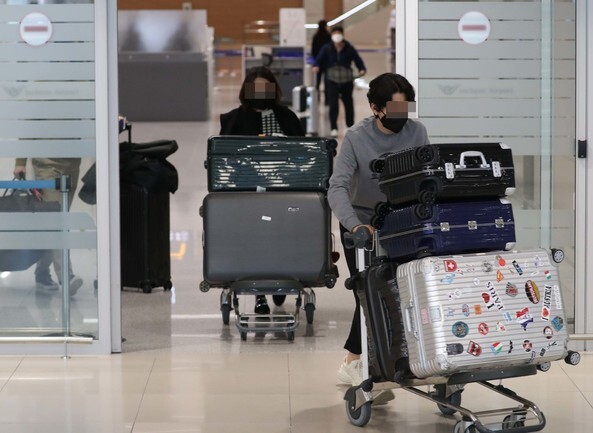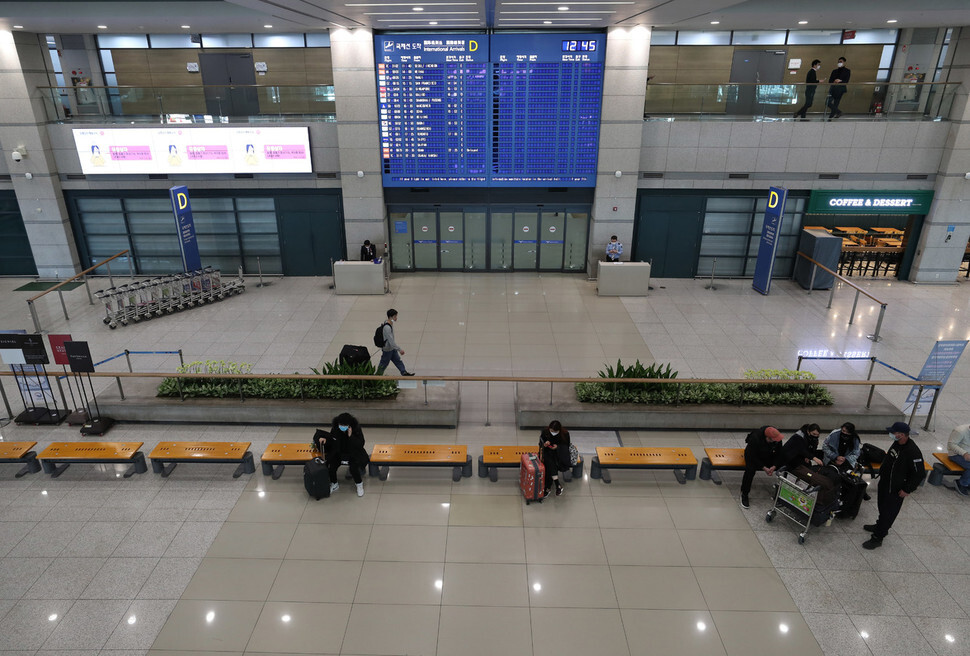hankyoreh
Links to other country sites 다른 나라 사이트 링크
S. Korea to consider quarantining all travelers arriving from overseas

Disease prevention officials are reviewing a system of mandatory self-isolation for all South Korean and foreign nationals arriving from overseas in order to prevent the novel coronavirus from spreading. The officials also asked all people arriving from overseas to practice strict self-isolation until additional government measures have been announced. As of Mar. 19, 12:00 am, special entry procedures were expanded to all arriving travelers.
“We’re discussing several plans, including mandatory self-isolation [for travelers arriving from overseas],” said Yoon Tae-ho, director of the disease prevention team for the central disaster relief headquarters, in a regular Central Disaster and Safety Countermeasure Headquarters briefing on the morning of Mar. 19.
“We’re looking from different angles at how to effectively manage people who pass through quarantine as asymptomatic and are not being captured at the quarantine stage,” he explained. While no decision had been made on whether the system would be mandatory, the Korea Centers for Disease Control and Prevention (KCDC) issued a request at a regular briefing the same afternoon for voluntary self-isolation by all individuals arriving from overseas, asking them to “refrain from going outside for 14 days.”

Indeed, infection fears have been growing amid numerous cases of arriving travelers who showed no apparent coronavirus symptoms during their airport quarantine check process, only to develop symptoms after arriving in local communities. Several cases of infection have arisen among fencers returning from a FIE Grand Prix event held in Budapest on Mar. 3-15. South Chungcheong Province announced on Mar. 19 that a 36-year-old member of the national women’s fencing team had tested positive for the virus. She was the third member of the women’s fencing team to be diagnosed, following others in Ulsan and Namyangju, Gyeonggi Province; all of them had attended the event in Hungary. The Korean Fencing Federation isolated around 30 members of the national team and instructors who had attended the event and had them undergo coronavirus testing.
In Seoul, half of the new cases diagnosed that day -- six out of 12 -- were found to be among individuals arriving from overseas. In the city’s Dongjak District, a married couple in their 30s who were in Spain between Mar. 6 and 15 tested positive after showing symptoms the day after their return to Korea. In the districts of Mapo, Gwangjin, and Gangnam, students studying abroad and travelers who had returned from Europe tested positive after their arrival. Two additional patients were diagnosed in Busan the same day: one a Swiss national, and the other an individual in their 20s who had visited Europe. In light of the situation, the government appears to be weighing a more intensive response than the one to date.
Additionally, disease prevention authorities moved to “generalize” special entry procedures, expanding them to apply to all arriving passengers as of Mar. 19, 12:00 am. The government previously expanded its list of countries and territories subject to special entry procedures based on the level of risk, beginning with the coronavirus’s epicenter in mainland China and neighboring Hong Kong and Macau. Between Mar. 13 and 18, a total of 17 South Korean and foreign nationals arriving from overseas were confirmed to be infected during quarantine check procedures.
The rise in infections from travelers arriving from overseas has also prompted calls to beef up airport quarantine check procedures. On Mar. 17, a 30-year-old male resident of Daejeon’s Jung (Central) District who was arriving after traveling in Europe for 41 days reported coronavirus-like symptoms at the Incheon International Airport quarantine station. While a sample was taken, the traveler was not placed in quarantine.
“We raised the issue, and the quarantine station said, ‘Our isolation room was full,’” a Daejeon city official said. “Given the risk of community infections spreading if the airport quarantine is breached, they need to step up their airport quarantine efforts.”
The KCDC reported that a total of 844 people had used the isolation facilities at the Incheon Airport quarantine station between Feb. 4, when the special entry procedures were first applied, and midnight on Mar. 19.
By Noh Ji-won, staff reporter, Song In-geol, Daejeon correspondent, and Kim Kwang-soo, Busan correspondent
Please direct comments or questions to [english@hani.co.kr]

Editorial・opinion
![[Column] The state is back — but is it in business? [Column] The state is back — but is it in business?](https://flexible.img.hani.co.kr/flexible/normal/500/300/imgdb/original/2024/0506/8217149564092725.jpg) [Column] The state is back — but is it in business?
[Column] The state is back — but is it in business?![[Column] Life on our Trisolaris [Column] Life on our Trisolaris](https://flexible.img.hani.co.kr/flexible/normal/500/300/imgdb/original/2024/0505/4817148682278544.jpg) [Column] Life on our Trisolaris
[Column] Life on our Trisolaris- [Editorial] Penalties for airing allegations against Korea’s first lady endanger free press
- [Editorial] Yoon must halt procurement of SM-3 interceptor missiles
- [Guest essay] Maybe Korea’s rapid population decline is an opportunity, not a crisis
- [Column] Can Yoon steer diplomacy with Russia, China back on track?
- [Column] Season 2 of special prosecutor probe may be coming to Korea soon
- [Column] Park Geun-hye déjà vu in Yoon Suk-yeol
- [Editorial] New weight of N. Korea’s nuclear threats makes dialogue all the more urgent
- [Guest essay] The real reason Korea’s new right wants to dub Rhee a founding father
Most viewed articles
- 1[Column] Why Korea’s hard right is fated to lose
- 2Amid US-China clash, Korea must remember its failures in the 19th century, advises scholar
- 360% of young Koreans see no need to have kids after marriage
- 4[Column] Can Yoon steer diplomacy with Russia, China back on track?
- 5[Column] The state is back — but is it in business?
- 6[Editorial] Stagnant youth employment poses serious issues for Korea’s future
- 7Hybe-Ador dispute shines light on pervasive issues behind K-pop’s tidy facade
- 8Inside the law for a special counsel probe over a Korean Marine’s death
- 9Japan says it’s not pressuring Naver to sell Line, but Korean insiders say otherwise
- 10Presidential office warns of veto in response to opposition passing special counsel probe act